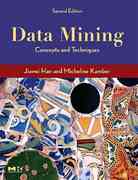Recently, researchers have proposed another kind of query, called a skyline query. A skyline query returns all
Question:
Recently, researchers have proposed another kind of query, called a skyline query. A skyline query returns all the objects \(p_{i}\) such that \(p_{i}\) is not dominated by any other object \(p_{j}\), where dominance is defined as follows. Let the value of \(p_{i}\) on dimension \(d\) be \(v\left(p_{i}, dight)\). We say \(p_{i}\) is dominated by \(p_{j}\) if and only if for each preference dimension \(d, v\left(p_{j}, dight) \leq v\left(p_{i}, dight)\), and there is at least one \(d\) where the equality does not hold.
a. Design a ranking cube (see the previous question) so that skyline queries can be processed efficiently.
b. Skyline queries are sometimes too strict to be desirable to some users. One may generalize the concept of skyline into generalized skyline as follows: Given a d-dimensional database and a query \(q\), the generalized skyline is the set of the following objects: (1) the skyline objects and (2) the nonskyline objects that are \(\epsilon\)-neighbors of a skyline object, where \(r\) is an \(\epsilon\)-neighbor of an object \(p\) if the distance between \(p\) and \(r\) is no more than \(\epsilon\). Design a ranking cube to process generalized skyline queries efficiently.
Step by Step Answer:

Data Mining Concepts And Techniques
ISBN: 9780128117613
4th Edition
Authors: Jiawei Han, Jian Pei, Hanghang Tong





